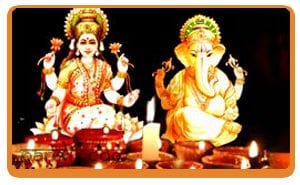Know About the Festival of Lights – Diwali in India

What is Diwali Puja?
‘Deepawali’ means a row of lights and it is one of the most auspicious festivals in India that is celebrated with great joy and enthusiasm all over the country. It is a conglomeration of five day festivities. On day 1, ‘Dhan-Teras’, On Day 2 –‘Roop Chaudas’, On Day 3, the main festival of ‘Deepawali’, On day 4 ‘Govardhan Pooja’ and on Day 5 ‘Bhai Dooj’ is celebrated. It is celebrated on the new moon day in the Hindu month of ‘Kartik’.
What is the history or origin of Diwali?
According to ‘Ramayana’, on this day, Lord Ram returned back to Ayodhya with his brother Lakshman and wife Sita, after spending fourteen long years in exile and killing Ravana, the evil king of ‘Lanka’. When Lord Ram sat on the throne of ‘Ayodhyaya’, his subjects celebrated by lighting lots of ‘diyas’ all over the kingdom and the tradition of celebrating Diwali started.
Another legend says that during the ‘Samundra Manthan’ process, Goddess of Wealth Laxmi, arrived from the ocean and Lord Vishnu married her. Followers of Jain religion also celebrate this day, as on this sacred day, their Lord Mahavira attained salvation. Lord Ganesha is also worshipped this day.
What is the significance of Diwali?
Diwali is the festival of lights that falls on Amavasya. It is the day that meant to be the night of darkness when moon does not rise and there is darkness everywhere. Light of Diwali symbolize positivity and Victory over evil souls. With the lights of Diwali, everyone wants to spread lights in every corner of their life and seeks to remove darkness from their life. On the auspicious day of festival of Diwali, people decorates their home and business areas with Diyas, electric decorative lights, candles, electric bulbs, colorful lights, etc. This makes their premises look amazingly beautiful. It is widely celebrated festival and falls in the month of October or November. It is celebrated by Hindus, Jains, Buddhists and Sikhs as well. Importance of Diwali varies for the different religions.
Diwali is the festival that is celebrated throughout India with equal enthusiasm by all the communities and classes. People wear new clothes on this day and they feel positive energy all over the day. All the age groups burn crackers with fun and joy. Everyone takes parts in activities like cleaning, Rangoli making at home, burning crackers, lightning, gatherings with family and friends. Everyone meets with their social circles to share sweets and exchange greetings. On this day of Diwali, people worship Lord
Ganesha, Goddess Lakshami, Maa Kali, Govardhan parvat and Lord Chitragupta. The celebration of Five days of festival starts with ‘Dhan Trayodashi’.
What items are required for the ‘Diwali Pujan’?
Silver coins, ‘Ten Suparis’, Rice grains, Five betel or mango leaves, Coconut, ‘kumkum’, ’21 diyas’, sweets, camphor, incense sticks, dry fruits, Lotus flower, petals of flowers, ‘roli’, ‘Panchamrita’ (mixture of milk, honey, curd, ‘ghee’ and sugar), oil for lighting ‘diyas’, rose water, Idol of Lord Ganesha and Goddess Laksmi are all required for performing Diwali Pujan.
What are the steps one has to follow for performing the five days Diwali ‘Pujan’?
Festival of Diwali brings series of festivals for five regular days. Due to this festival, people celebrate all the other festivals with joy and happiness.
Day 1: ‘Dhanteras’
The day marks the commencement of festivities; Lord ‘Dhanvantri’ appeared from the ocean this day. ‘The divine power’ is worshipped this day for wealth and happiness. People clean, renovate, decorate their houses and make ‘Rangoli’ on the entrance of their houses to welcome Goddess Laxmi. ‘Diyas’ are lit and placed in the corners of the house along with the kitchen area. People buy gold and silver ornaments this day. It is also considered auspicious to buy ornaments this day. Rural people worship their cattle this day.
Day 2: ’Narak Chaturdashi’ or ‘Roop Chaudas’
The legend says that Lord Vishnu killed the demon Narakasur this day and saved the people of earth. It is also said that Goddess Laxmi hates houses which are not clean, therefore people clean their houses and themselves properly this day to please the Goddess. Ladies of the house get up before sunrise and anoint themselves with ‘ubtan’ (scrub) in order to become beautiful. ‘Diyas’ are lit this day as well.
Day 3: ‘Diwali Pujan’
Though the whole day is considered auspicious to perform Diwali Pujan but there are separate ‘Muharats’ for performing ‘pujan’ at homes and work areas. People along with their whole family perform ‘Pujan’ at home and with staff members at the office in order to seek blessings from Goddess Laxmi to attain success, prosperity and well being. A lot of ‘Diyas’ are lit and placed everywhere in the house. People distribute sweets and gifts to family and friends and burst crackers with them to celebrate the festival. They also donate food and clothes to the needy in order to share their wealth. It is said that Goddess Laxmi blesses those who are selfless and hard working individuals.
Day 4: ‘Govardhan Pooja’
People worship cows this day as they are considered to be the most auspicious animal according to Hindu religion. Cow assimilates all 36 crore deities of Hindus in itself. In places such as Mathura and Nathdwara, people prepare ‘annakoot’ (a variety of 64 different delicacies) and offer it to the Lord Vishnu. Mothers put ‘teeka’ on the forehead of their sons in order to bless them and save them from any unpleasant situations.
Day 5: ‘Bhai Dooj’
This day is celebrated by siblings with love. The sisters apply ‘teeka’ on the forehead of their brothers and seek Lord Yama’s blessings for their brother’s long and prosperous lives. The brothers give sweets and other things to please them. This day marks the end of Diwali Festivities.